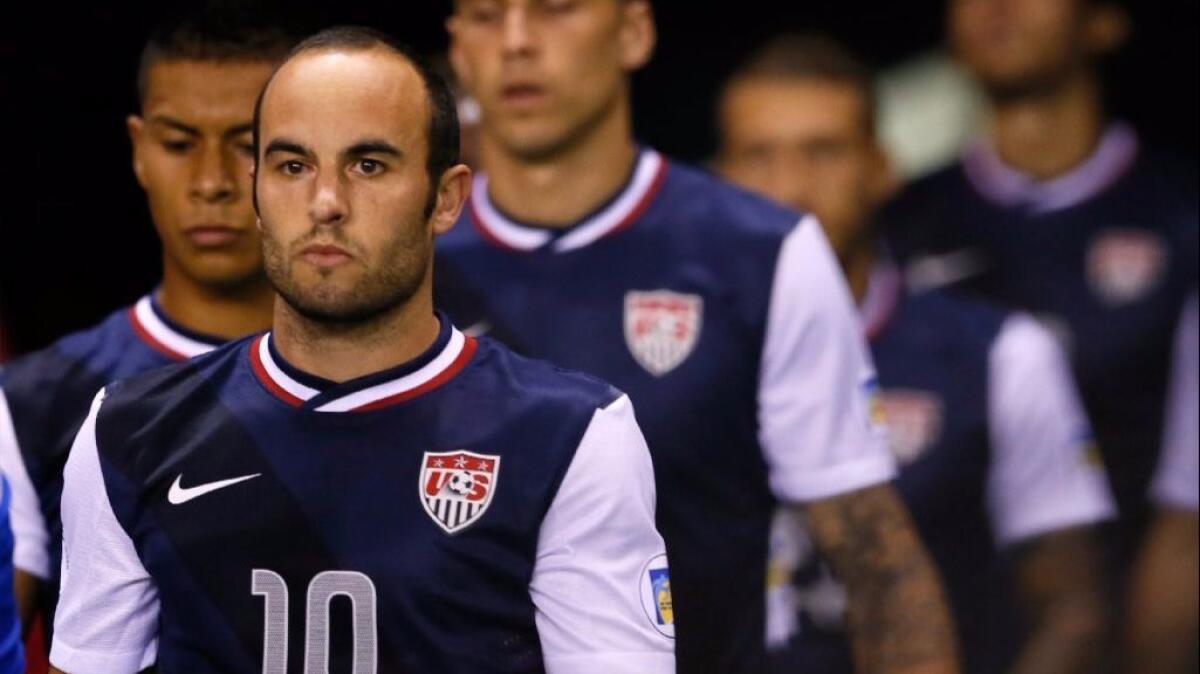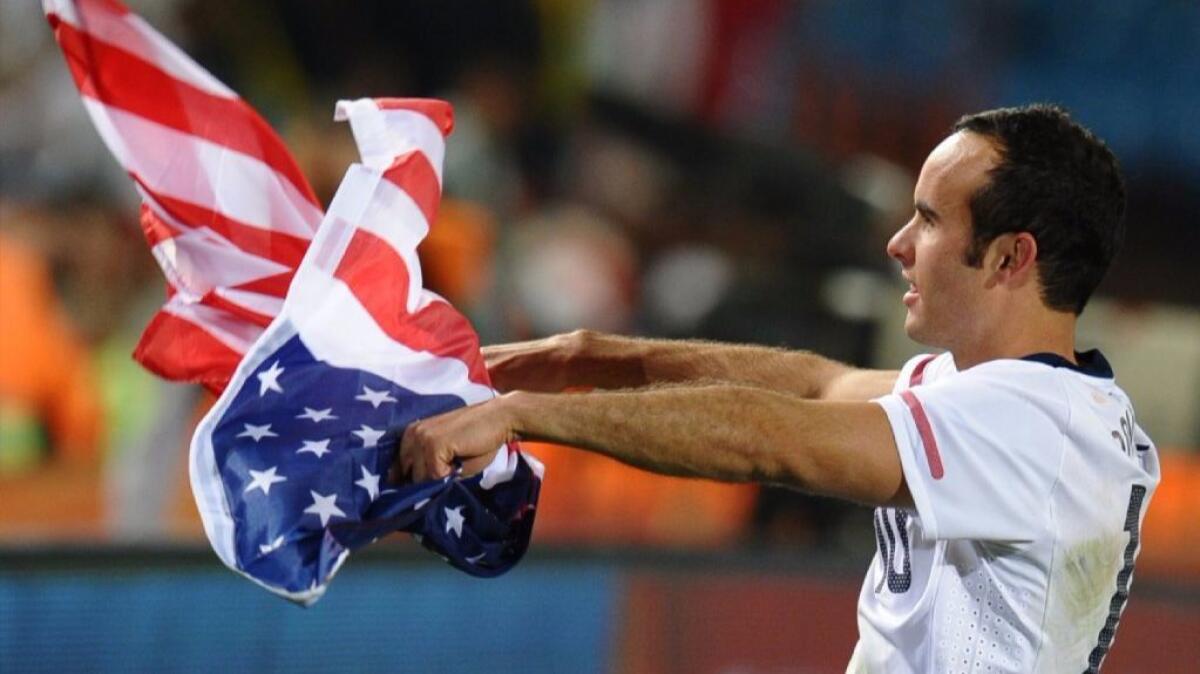Landon Donovan came of age as U.S.-Mexico soccer rivalry blossomed

- Share via
Dear Mexico, Landon Donovan would like to apologize.
Although the greatest player in U.S. soccer history grew up in Southern California, where he learned Spanish by playing against Mexican American kids, he says he had little understanding of the importance Mexicans place on the U.S.-Mexico rivalry.
So when, as an 18-year-old, he scored the goal that beat Mexico in his first international cap, he figured, how big can these games be?
“I didn’t realize the extent of the rivalry early on. And I didn’t, especially, realize what it meant to the Mexican people,” Donovan says. “So I ran my mouth a lot and said a lot of stupid things. And I regret that.
“I should have had more respect for the people and the players and the rivalry. As I got older, I realized that.”
With age, after all, comes wisdom. And while Donovan, at 35, is hardly old, he has grown wise enough to now rank the U.S.-Mexico rivalry, which resumes Sunday in Mexico City (5:30 p.m. PT, FS1, Univision, UDN), alongside Germany-Holland, Argentina-Brazil and Italy-France as one of the best in international soccer.
“What makes a rivalry special and great is the feeling around it,” he says. “And the feeling around that game — the atmosphere, the buildup, the media attention — are all the same as they are in any of those other rivalries.”
Especially when there’s something at stake, as there will be in Sunday’s game, a World Cup qualifier. With a victory, Mexico, unbeaten halfway through the final round of qualifying, will all but clinch a spot in next summer’s tournament in Russia while moving a giant step closer to winning the CONCACAF competition for the first time in 20 years.
For the U.S., meanwhile, a loss would slow a team that is unbeaten this year, having jumped from last to third in the six-team tournament since March.
The rivalry wasn’t always a rivalry, though. In fact, until 1997, U.S. vs. Mexico wasn’t even much of a game. Although the Americans won the first match, in 1934, it wasn’t until 1980 that they won again. And entering World Cup qualifying in 1997, Mexico led the series 24-5-7.
But that year, the U.S. played Mexico to a pair of draws, including a scoreless tie in Mexico City that ended a 15-game losing streak there. Three years later came the 2-0 victory Donovan engineered in his international debut, and two years after that, Donovan scored in another 2-0 win — this time in the 2002 World Cup — and the Border War began to take shape.
“That, I think, was one of the bigger moments that really took it to another level, that solidified it as ‘OK, this is going to be a rivalry of the ages,’ ” says Cobi Jones, who also was on that World Cup team. “Yes there’s more history with a lot of other [rivalries]. But this one has intensified.”

It intensified when Mexico’s Rafa Marquez felled Jones with a head-butt in the waning moments of that World Cup game, earning a red card and a multigame suspension. It intensified when U.S. defender Oguchi Onyewu’s stared down Mexico’s Jared Borgetti in a 2005 qualifier in Columbus, Ohio, and when Mexican assistant Francisco Ramirez delivered a slap attack on U.S. defender Frankie Hejduk following a 2009 qualifier.
There also was the knee Mexico’s Ramon Ramirez delivered to the manhood of American defender Alexi Lalas in a not-so-friendly friendly at the Rose Bowl and the time Donovan — and a number of teammates — relieved themselves on a practice field in Guadalajara.
(Donovan insists that last incident took place only after stadium workers locked the U.S. players out of the locker room and public restrooms.)
That newfound intensity swung the rivalry in the Americans’ favor, though, with Mexico winning just six of 19 games since that 2002 World Cup match. Even Estadio Azteca, has lost its mojo, with the U.S. escaping with a win and a draw in its last two visits there.
“It’s ebbed and it’s flowed over the years,” Donovan says. “But then, particularly after that World Cup game, it was really nasty.
“As you get older, you appreciate it more. At the end of my career, all these guys that were villains, I ended up having so much respect for.”
And Mexico ended up having respect for Donovan. Sure, he was the U.S. player Mexicans hated the most, the one who was pelted with beer bottles, batteries and even plastic bags filled with urine. But Mexicans hated him because he was good, and when they couldn’t intimidate him, they grew to appreciate him — so much so that Mexican TV giant Televisa featured him in a commercial for a soccer-themed lottery.
Mexico fans also liked the fact he spoke to them in Spanish. So as Donovan matured, so did the rivalry.
“I got thrown into the rivalry without knowing [the rivalry],” says Donovan, who remains the U.S. record-holder for goals and assists. “But then, I was fortunate to be a part of some unbelievable games, both here and in Mexico — just numerous, incredible games.
“It’s as big as any other rivalry in the soccer world. And that’s what makes it so special for all of us.”
Follow Kevin Baxter on Twitter @kbaxter11







